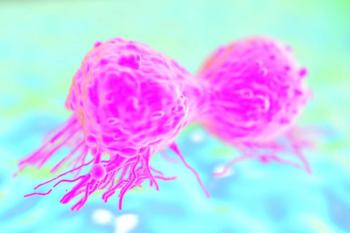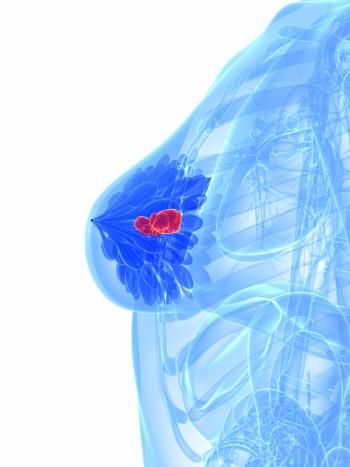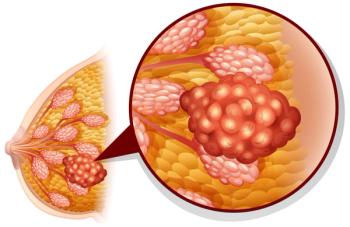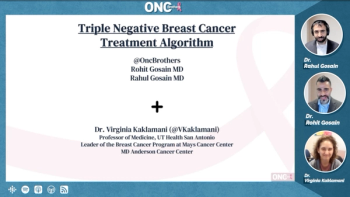
Oncology NEWS International
- Oncology NEWS International Vol 18 No 8
- Volume 18
- Issue 8
PARP Inhibitors Generate Buzz in Triple-Negative Breast Tumors
ORLANDO-Oncologists can expect to hear more about inhibitors of the enzyme poly (ADP-ribose) polymerase-1, or PARP. An experimental agent in this class, BSI-201, prolonged event-free and overall survival in patients with triple-negative breast cancer when used together with gemcitabine (Gemzar) and carboplatin, according to early study results.
ORLANDO-Oncologists can expect to hear more about inhibitors of the enzyme poly (ADP-ribose) polymerase-1, or PARP. An experimental agent in this class, BSI-201, prolonged event-free and overall survival in patients with triple-negative breast cancer when used together with gemcitabine (Gemzar) and carboplatin, according to early study results.
Progression-free survival doubled from 3.3 months with chemotherapy alone to 6.9 months with the addition of BSI-201 (P < .0001), and overall survival was improved from 5.7 months to 9.2 months, respectively (P < .0005), reported Joyce O’Shaughnessy, MD, of Charles A. Sammons Cancer Center at Baylor University Medical Center and Texas Oncology, both in Dallas.
“There was a 50% reduction in the risk of death with BSI-201 in this small, randomized phase II clinical trial, and that was highly statistically significant. Interestingly, and different from what we are used to, this drug does not add any toxicity to chemotherapy,” she remarked at an ASCO 2009 press conference.
In addition, the clinical benefit rate improved from 21% to 62% (P = .0002) with BSI-201, and the overall response rate increased from 16% to 48% (P = .002). The addition of the novel agent did not increase toxicity over that of chemotherapy alone. PARP inhibitors block an enzyme involved in base excision DNA repair, thereby enhancing the ability of chemotherapy to damage the DNA of cancer cells, especially with platinum agents. The rationale for using PARP inhibitors for triple-negative tumors is based on the abundance of PARP in these tumors and their reliance on single-strand DNA repair, she explained.
The study included 116 women with metastatic triple-negative breast cancer (HER2-negative, ER-negative, and PR-negative). Triple-negative status is seen in about 15% of breast cancer patients, and in many patients with BRCA mutations.
Patients were randomized to chemotherapy with gemcitabine and carboplatin on days one and eight every three weeks, or to the same regimen plus BSI-201 on days one, four, eight, and 11. Upon disease progression, about half the control arm crossed over to receive BSI-201 as well (abstract 3).
“We do plan a large phase III trial to basically recapitulate these results in a much larger population, again allowing the patients to crossover,” Dr. O’Shaughnessy said.
Commenting on the study to Oncology News International, Merrill J. Egorin, MD, said that critical questions related to dosing, frequency, and duration of PARP inhibition, and dose timing with regard to cytotoxic agents, still need to be answered in order to optimize the use of these agents.
Dr. Egorin, who is based at the University of Pittsburgh Cancer Institute, said that PARP inhibitors appear to enhance the antiproliferative activity of DNA-damaging agents, and that they selectively kill cells deficient in BRCA1 and 2. He added that there could be a role for PARP inhibitors as preventive agents in patients with BRCA mutations.
The latest PARP-based research
• “Inhibition of poly(ADP-ribose) polymerase in tumors from BRCA mutation carriers,” N Engl J Med 361:123-134, 2009.
• “BiPar Sciences presents interim phase 2 results for PARP inhibitor BSI-201 at San Antonio Breast Cancer Symposium,” Cancer Biol Ther 8:2-3, 2009.
• “Poly(ADP-ribose) polymerase-1 inhibitor treatment regresses autochthonous Brca2/p53-mutant mammary tumors in vivo and delays tumor relapse in combination with carboplatin,” Cancer Res 69:3850-3855, 2009.
Articles in this issue
over 16 years ago
New Doxil-based regimens don’t fly with FDA advisorsover 16 years ago
Four steps to improve the profitability of your oncology practiceover 16 years ago
Mathematical model predicts resistance to Herceptinover 16 years ago
ASTRO issues guide on accelerated breast radiotherapyover 16 years ago
Study renews breast ca link to migrainesover 16 years ago
Sutent shows promise for brain metastases in NSCLC patientsover 16 years ago
Abraxane, carboplatin pack one-two punch in two types of lung cancerover 16 years ago
Discord prevails over pt privacy in clinical trialsNewsletter
Stay up to date on recent advances in the multidisciplinary approach to cancer.




































